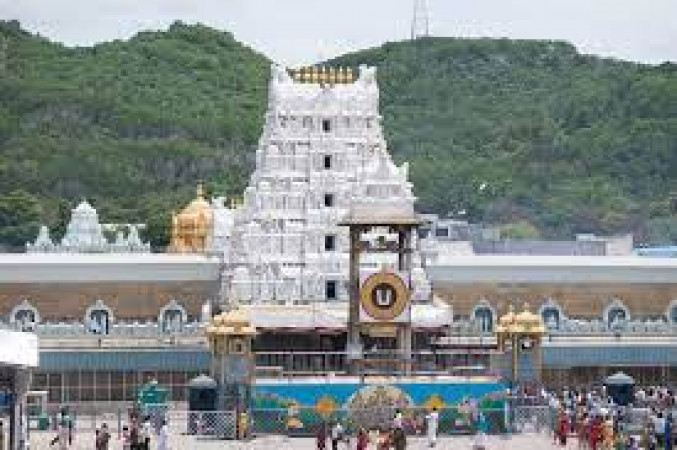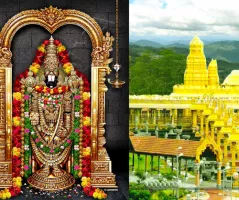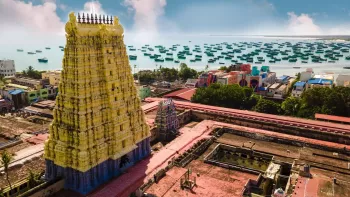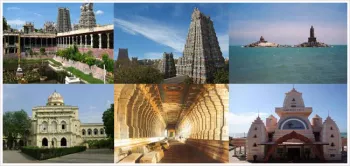
Tirumala Venkateshwara Temple
Duration
1 to 2 Days
1 to 2 Days
Best time to visit
Oct-Dec
Oct-Dec
Theme
Religious
Religious
Tirumala Venkateshwara Temple Travel Guide
Tirumala Venkateshwara Temple, located in the hill town of Tirumala in Andhra Pradesh, India, is one of the most revered and wealthiest temples in the country. Dedicated to Lord Venkateshwara, an incarnation of Lord Vishnu, the temple attracts millions of pilgrims and tourists every year. The temple's history dates back centuries, with intricate architecture and religious significance that make it a must-visit destination for spiritual seekers and history enthusiasts alike.Top Attractions in Tirumala Venkateshwara Temple
- Lord Venkateshwara Darshan
- Sri Vari Museum
- Srivari Padalu
- Akasa Ganga
- Sila Thoranam
Tirumala Venkateshwara Temple is Famous for
Pilgrimage to seek the blessings of Lord Venkateshwara and experience the spiritual aura of the temple.Top Attractions in Tirumala Venkateshwara Temple
- Witnessing the grandeur of Lord Venkateshwara Darshan
- Exploring the ancient artifacts at Sri Vari Museum
- Visiting the sacred footprints at Srivari Padalu
- Admiring the natural beauty at Akasa Ganga
- Marveling at the geological wonder of Sila Thoranam
What's Great about Travelling to Tirumala Venkateshwara Temple?
- Perfect for spiritual seekers and devotees
- Rich historical and cultural significance
- Breathtaking hilltop location with scenic views
What's Not So Great about Travelling to Tirumala Venkateshwara Temple?
- Heavy crowds, especially during peak pilgrimage seasons
- Strict dress code and temple regulations
- Limited accommodation options on the hill
Travel Tips for Tirumala Venkateshwara Temple
- Book darshan tickets in advance to avoid long queues
- Follow the dress code and temple etiquette
- Carry necessary identification and valuables securely
Important Tirumala Venkateshwara Temple trip information
- Ideal Duration: 1-2 days to explore the temple and surrounding areas
- Best Time to Visit: Visit during the cooler months of September to February
- Nearby Airports and Railway Stations: The nearest airport is in Tirupati, and the closest railway station is Tirupati Railway Station
Per Person
11,900
*EXCLUDING APPLICABLE TAXES 4.1 Ratings
( 56 Reviews )
( 56 Reviews )
Total
85,000
*EXCLUDING APPLICABLE TAXES 4.1 Ratings
( 56 Reviews )
( 56 Reviews )
Per Person
16,500
*EXCLUDING APPLICABLE TAXES 4.1 Ratings
( 56 Reviews )
( 56 Reviews )
Per Person
20,500
*EXCLUDING APPLICABLE TAXES 4.1 Ratings
( 56 Reviews )
( 56 Reviews )
FAQ's on Tirumala Venkateshwara Temple
Q1: What is the best time to visit Tirumala Venkateshwara Temple?
The best time to visit Tirumala Venkateshwara Temple is during the cooler months from November to February when the weather is pleasant for exploring the temple complex. Additionally, the temple sees a surge in visitors during festivals like Brahmotsavam in September/October and Vaikuntha Ekadashi in December/January. It is advisable to check the temple calendar for important events and plan your visit accordingly.
Q2: Do I need a visa to travel to Tirumala Venkateshwara Temple?
As Tirumala Venkateshwara Temple is located in India, visitors from most countries require a valid tourist visa to enter. However, there are some exceptions for nationals of certain countries who may be eligible for visa-on-arrival or e-visa. It is important to check with the Indian embassy or consulate in your country for specific visa requirements and ensure you have the necessary documentation before traveling.
Q3: What are the must-visit attractions in Tirumala Venkateshwara Temple?
The must-visit attractions in Tirumala Venkateshwara Temple include the main sanctum sanctorum where Lord Venkateshwara is worshipped, the stunning Gopurams (gateway towers), Akasa Ganga waterfall, Silathoranam (natural rock formation), and the Vaikuntha Dwaram. Don't miss the opportunity to participate in the various sevas (rituals) conducted at the temple for a unique spiritual experience.
Q4: Is Tirumala Venkateshwara Temple a safe place to travel?
Tirumala Venkateshwara Temple is generally a safe place to visit, with a strong security presence to ensure the safety of pilgrims. It is advisable to be cautious of pickpockets in crowded areas and to adhere to any instructions given by temple authorities. While the temple complex itself is safe, it is recommended to avoid isolated areas and be mindful of your belongings during your visit.
Q5: What is the local currency in Tirumala Venkateshwara Temple and can I use credit cards?
The local currency in Tirumala Venkateshwara Temple is the Indian Rupee (INR). While there are a few ATMs in the vicinity, it is recommended to carry sufficient cash for small purchases and offerings. Credit cards may not be widely accepted within the temple complex, so it is advisable to have cash on hand. Money exchange facilities are available in nearby towns for foreign currency conversion.
Q6: What is the local cuisine like in Tirumala Venkateshwara Temple?
The local cuisine in Tirumala Venkateshwara Temple is predominantly vegetarian, with an emphasis on South Indian dishes like dosas, idlis, vadas, and rice preparations. The temple also offers prasadam (blessed food) to devotees, which usually includes sweet pongal, tamarind rice, and curd rice. Visitors can enjoy delicious traditional meals at the temple's dining halls known as Annaprasadam. It is important to note that non-vegetarian food and alcohol are strictly prohibited within the temple premises.
Q7: What transportation options are available in Tirumala Venkateshwara Temple?
Transportation options in Tirumala Venkateshwara Temple include buses, taxis, and private vehicles. The nearest major city is Tirupati, which is well-connected by road and rail. From Tirupati, regular buses and taxis are available to reach the temple complex atop the hill. Pilgrims can also opt for the traditional footpath known as Srivari Mettu or take the free shuttle services provided by the temple. It is advisable to plan your transportation in advance, especially during peak pilgrimage seasons.
Q8: Are there any cultural norms or etiquette I should be aware of when visiting Tirumala Venkateshwara Temple?
When visiting Tirumala Venkateshwara Temple, it is important to follow certain cultural norms and etiquette. Dress modestly in traditional attire and remove footwear before entering the temple premises. Photography is restricted in certain areas, so be respectful of the rules. Avoid bringing non-vegetarian food, alcohol, and tobacco products into the temple complex. Maintain silence and refrain from engaging in loud conversations. It is customary to offer prayers and make offerings with devotion. By respecting the traditions and customs of the temple, visitors can have a spiritually enriching experience during their visit.
Q9: I am a travel agent. How can I buy travel leads of Tirumala Venkateshwara Temple?
Register yourself as a travel agent at agents.tripclap.com and then you can buy travel leads to Tirumala Venkateshwara Temple once your account is approved. For more details contact our support team at +91-8069186564 or support@tripclap.com



